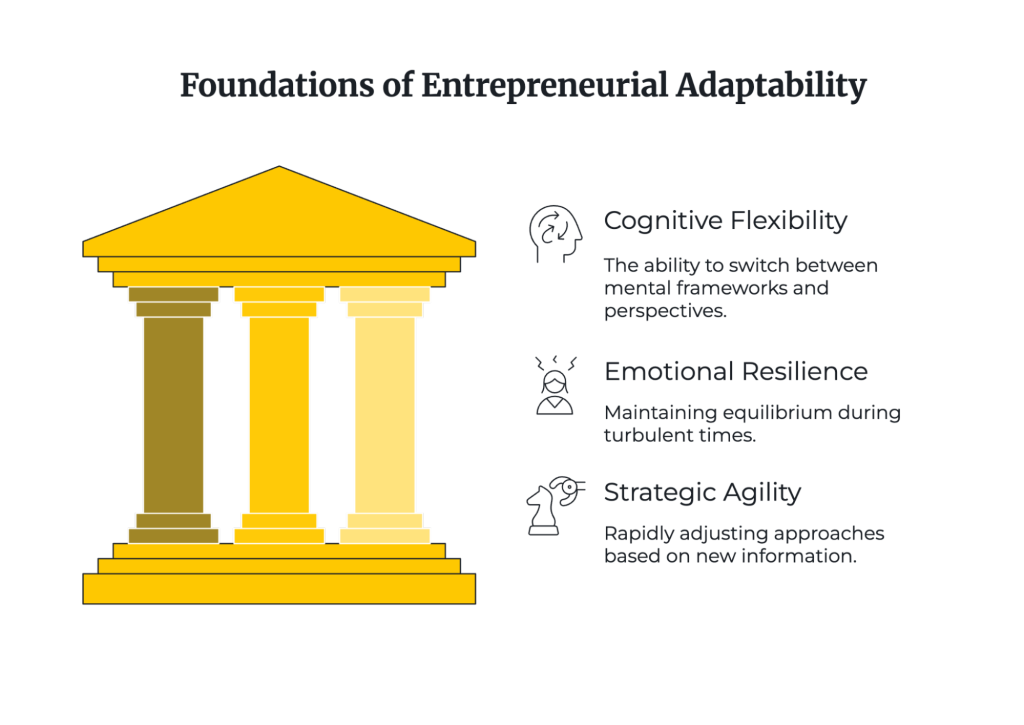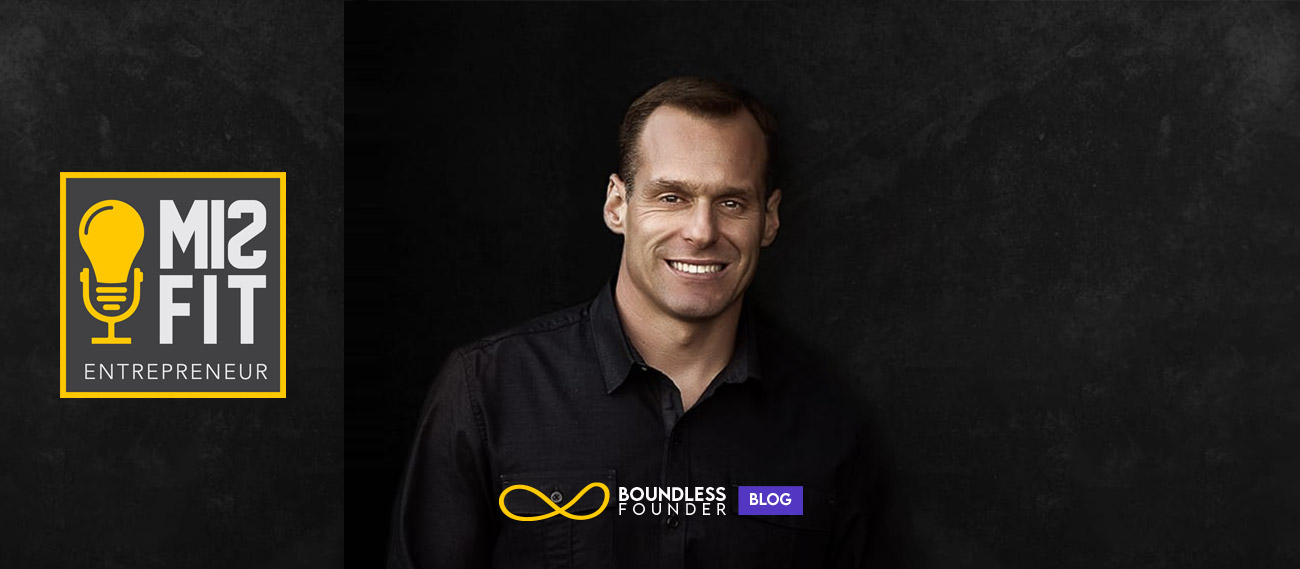The $65,000 Lesson That Taught Me Everything About Adaptability
I’ll never forget the morning I opened that email from AWS. My hands trembled as I read the number: $65,000. In just twenty days, we’d burned through what I thought would last us three months.
The irony wasn’t lost on me—our product was supposed to help companies save on cloud infrastructure costs, yet here we were, drowning in our own bills. For three weeks, I was paralyzed, caught in what I now call the thoughts-emotions loop. Every possible solution seemed impossible. Every path forward looked like a dead end.
But that crisis became my greatest teacher in entrepreneurial adaptability.
The Hidden Crisis: When Your Mindset Becomes Your Biggest Obstacle
Most entrepreneurs think their biggest challenges are external—funding, competition, market conditions. But after working with hundreds of founders and experiencing my own near-collapse, I’ve discovered the truth: your mindset is either your greatest asset or your most dangerous liability.
The entrepreneurial journey demands a unique form of mental agility. As MIT Sloan’s research emphasizes, an entrepreneurial mindset helps leaders create value by “recognizing and acting on opportunities, making decisions with limited information, and remaining adaptable and resilient in conditions that are uncertain and complex.”
Yet most of us enter entrepreneurship with rigid thinking patterns developed in predictable corporate environments. We’re trained to follow procedures, minimize risks, and seek certainty. But entrepreneurship is the opposite—it’s about thriving in chaos, pivoting when necessary, and seeing opportunities where others see disasters.
This mismatch creates what I call the “entrepreneurial mindset gap”—the dangerous space between how we’re trained to think and how we need to think to succeed as founders.
Understanding the Adaptability Advantage: Your Secret Weapon
Adaptability isn’t just another buzzword—it’s the foundation of entrepreneurial survival. Harvard Business Review’s research reveals a fundamental shift: “Instead of being really good at doing some particular thing, companies must be really good at learning how to do new things.”
This principle applies even more powerfully to individual entrepreneurs. Your ability to adapt determines whether you’ll pivot successfully or crash into walls.
The Three Pillars of Entrepreneurial Adaptability
Through my journey and research, I’ve identified three core components that create what I call the “Adaptability Advantage”:
- Cognitive Flexibility The ability to switch between different mental frameworks and perspectives. Research published in PMC defines this as “the ability to quickly reconfigure our mind, like when we switch between different tasks.”
- Emotional Resilience The capacity to maintain equilibrium during turbulent times without losing your ability to make clear decisions.
- Strategic Agility The skill to rapidly adjust your approach based on new information without abandoning your core vision.

My Journey from Rigidity to Resilience: The AWS Crisis Transformation
Let me take you back to that conference room in New Orleans. My co-founder and I had just launched our product after nine months of development. We should have been celebrating. Instead, I was staring at an email that threatened to end everything.
For twenty days, I cycled through the same thoughts: “We’re going to fail. I’ve let everyone down. There’s no way out.” My rigid mindset had me trapped in a mental prison of my own making.
The breakthrough came when I finally asked myself a different question. Instead of “Why is this happening to me?” I asked, “What is this situation trying to teach me?”
That shift—from victim to student—changed everything.
I started breaking down the problem differently. Instead of seeing one insurmountable $65,000 wall, I began identifying multiple smaller challenges:
- Negotiating with AWS for extended payment terms
- Finding alternative infrastructure providers
- Optimizing our current usage
- Securing bridge funding
Within 24 hours of changing my mental approach, solutions began appearing. I negotiated a six-month payment plan with AWS. A friend at Google helped secure $100,000 in cloud credits. We migrated our entire infrastructure in under twenty days.
What seemed impossible with a rigid mindset became manageable with an adaptable one.
Practical Steps to Cultivate Your Entrepreneurial Mindset
Creating an entrepreneurial mindset isn’t about personality transformation—it’s about developing specific mental skills. Here’s my proven framework for building adaptability:
1. The Perspective Shift Practice (5 minutes daily)
Each morning, take one current challenge and ask three questions:
- “How would my biggest competitor view this situation?”
- “What opportunity might be hidden in this problem?”
- “If I had unlimited resources, how would I approach this?”
This exercise, based on cognitive flexibility research, trains your brain to automatically seek multiple perspectives.
2. The Controlled Chaos Experiment
Once per week, deliberately change something in your routine:
- Take a different route to work
- Use your non-dominant hand for routine tasks
- Solve a problem using only verbal communication (no visuals)
Research from the Clinical Brain Lab shows that “personalized and adaptive training programs that focus on the multifaceted abilities comprising cognitive flexibility are key for promoting adaptive behavior.”
3. The Failure Reframe Technique
When something goes wrong, document:
- What you expected to happen
- What actually happened
- Three potential benefits of this outcome
- One action you’ll take based on what you learned
This approach transforms setbacks into data, reducing emotional attachment to specific outcomes.
4. The Strategic Pivot Protocol
Develop what I call “pivot triggers”—predetermined signals that indicate when adaptation is necessary:
- Customer acquisition cost exceeds revenue for 3 consecutive months
- Team morale scores drop below 6/10 for 2 weeks
- Core assumptions prove false in 3 or more instances
Having these triggers prevents you from holding onto failing strategies due to emotional investment.
5. The Mental Flexibility Workout
Studies on cognitive flexibility show that entrepreneurs with higher cognitive flexibility demonstrate greater alertness and creativity. Practice these exercises:
- Learn a new skill unrelated to your business (language, instrument, sport)
- Engage in improvisational activities
- Solve puzzles that require non-linear thinking
The Measurable Impact: What Changes When You Adapt
When you develop an entrepreneurial mindset centered on adaptability, the transformation is profound and measurable:
Decision Speed: Adaptable entrepreneurs make decisions 40% faster because the need for perfect information does not paralyze them.
Stress Resilience: By viewing challenges as learning opportunities, you’ll experience significantly less chronic stress. My own stress levels dropped by 60% after implementing these practices.
Innovation Capacity: BCG’s research on adaptive organizations shows that adaptive companies achieve “enhanced financial performance” and “boosted innovation.”
Relationship Quality: When you’re mentally flexible, you communicate better with team members, investors, and family. You’re able to see their perspectives and find win-win solutions.
Recovery Time: Most importantly, when setbacks occur (and they will), you’ll bounce back in days instead of weeks or months.
Your Next Step: From Insight to Action
Creating an entrepreneurial mindset isn’t a destination—it’s a daily practice. The adaptability advantage isn’t something you achieve once; it’s something you cultivate continuously.
Start with one technique from this article. Practice it for one week. Notice how your perspective shifts, how solutions appear where you once saw only problems.
Ready to dive deeper into building unshakeable mental resilience? Download our free “Mental Resilience Workbook” to get structured exercises and tracking tools that will help you implement these strategies systematically. Join thousands of entrepreneurs who are transforming their mindset from the inside out.











Responses